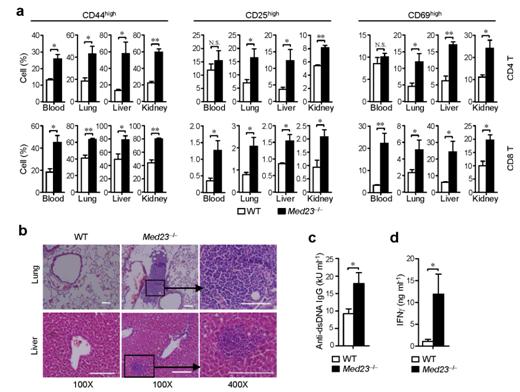
Researchers from Institute of Biochemistry and Cell Biology (SIBCB), Shanghai Institutes for Biological Sciences of Chinese Academy of Sciences, found a subunit of the mediator complex named Med23 which may regulate T-cell activation and prevent autoimmunity in mice. Their study was published online on Nature Communications on Oct 10, 2014.
Precise control of T-cell activation ensures that T cells discriminate between foreign and self-antigens to promote effective immune response without fostering autoimmunity. Although many changes of T-cell receptor-associated signaling molecules affect T-cell activation, the transcriptional mechanisms that control this process remain largely unknown.
Under the supervision of Prof. LIU Xiaolong and Prof. WANG Gang from SIBCB, SUN Yang, ZHU Xiaoyan and colleagues identified that T cell-specific deletion of Med23 led to hyper-activation of T cells. Moreover, aged Med23-deficient (Med23−/−) mice exhibited an autoimmune syndrome.
The researchers investigated the role of Med23 in immunology using a Med23 conditional knockout mouse model. They found Med23−/− T cells had a hyper-activated phenotype in the periphery, compared to T cells from wild-type mice. Adoptive transfer experiments indicated a cell-intrinsic role for Med23 in the hyper-activation of T cells. Med23 deficiency led to an autoimmune syndrome in aged mice. Med23 regulated T-cell activation by promoting the expression of its negative regulators, including Egr2, Klf2 and Foxp1. Med23 deficiency enhanced anti-tumor T cell function, which inhibited tumor growth in a spontaneous breast cancer mouse model.
These findings shed light on the molecular basis for the regulation of T-cell activation and provided important implications for therapies in autoimmune diseases and cancers.
The work was entitled “The mediator subunit Med23 contributes to controlling T-cell activation and prevents autoimmunity” and was supported by grants from 973 program, National Natural Science Foundation of China, and Shanghai Municipality.

Figure: Loss of Med23 results in autoimmune symptoms. (a) Percentage statistics for CD44, CD25 and CD69 expression in isolated T cells. (b) Mononuclear cell infiltration in the lung and liver. The anti-dsDNA IgG (c) or IFNγ concentration (d) in the serum of aged mice. (Image by Prof. LIU Xiaolong’s group)

86-10-68597521 (day)
86-10-68597289 (night)

86-10-68511095 (day)
86-10-68512458 (night)

cas_en@cas.cn

52 Sanlihe Rd., Xicheng District,
Beijing, China (100864)

